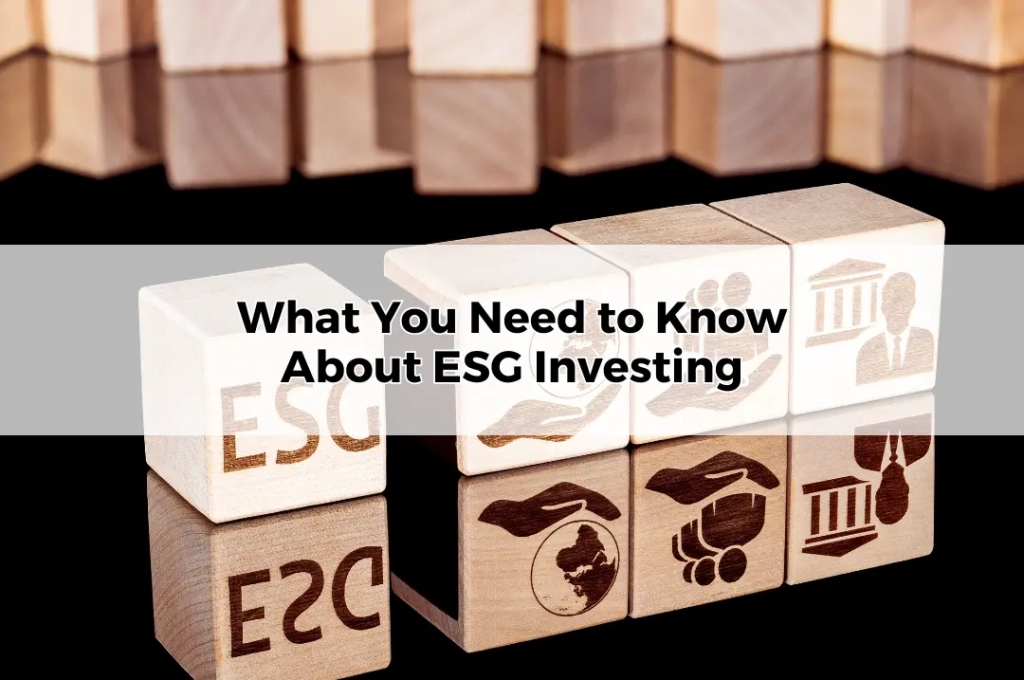What You Need to Know About ESG Investing
Table of Contents
ToggleEnvironmental, Social, and Governance (ESG) investing is an investment approach that has gained significant traction in recent years as individuals and institutions increasingly seek to align their financial decisions with their ethical and environmental values. ESG investing goes beyond traditional financial metrics, incorporating a company’s environmental practices, social responsibilities, and governance standards into the investment decision-making process. For Australian investors, this approach offers an opportunity to generate competitive financial returns while supporting businesses that are committed to sustainability and ethical operations.
While ESG investing is a growing trend, it requires more than just a surface-level understanding. It is a disciplined, research-intensive strategy that evaluates how a company’s operations and practices affect stakeholders, the environment, and long-term risk. By understanding the principles of ESG investing, its benefits, challenges, and how to integrate it into your portfolio, you can make informed decisions that reflect both your financial goals and your commitment to responsible investing.
What is ESG Investing?
ESG investing evaluates companies based on three key pillars: Environmental, Social, and Governance factors. The environmental aspect examines how a company manages its environmental impact, including efforts to reduce carbon emissions, improve energy efficiency, and adopt sustainable resource management practices. Social factors focus on how a company interacts with its employees, customers, and communities. This includes diversity and inclusion initiatives, employee welfare, and community engagement programs. Governance factors assess a company’s leadership, transparency, accountability, and ethical decision-making.
By considering these factors, ESG investing provides a more holistic view of a company’s potential risks and opportunities, going beyond financial performance to account for broader impacts. For example, companies with poor governance or significant environmental controversies may face regulatory fines or reputational damage, which could hurt long-term profitability. Conversely, businesses that excel in ESG factors often demonstrate resilience, adaptability, and strong stakeholder relationships, positioning them for sustained success in a rapidly evolving world.
The Growing Popularity of ESG Investing
The rise of ESG investing reflects a shift in how investors perceive the role of capital. No longer solely focused on maximising financial returns, investors are increasingly seeking to drive positive social and environmental change through their investment choices. Factors such as heightened awareness of climate change, growing demand for corporate accountability, and the increasing influence of socially conscious millennials in investment markets have propelled ESG investing into the mainstream.
Globally, trillions of dollars are now allocated to ESG-oriented funds and strategies, and Australia has emerged as a leader in sustainable finance. Regulatory changes, such as the increased emphasis on ESG disclosure requirements for companies, have further accelerated this trend. Many investors now view ESG investing as not just a moral imperative but also a prudent financial strategy, given the growing body of evidence that companies with strong ESG practices tend to outperform over the long term.
Benefits of ESG Investing
The benefits of ESG investing are both ethical and financial, making it an attractive option for a broad range of investors. For those seeking to align their investments with their personal values, ESG investing provides a tangible way to support companies that prioritise sustainability, social responsibility, and ethical governance. Whether it’s investing in renewable energy companies, supporting businesses with strong diversity initiatives, or avoiding firms involved in harmful practices like tobacco or fossil fuels, ESG investing allows individuals to make a positive impact with their capital.
From a financial perspective, ESG investing helps mitigate risks that traditional financial analysis may overlook. Companies with poor environmental practices or weak governance are often more vulnerable to regulatory fines, lawsuits, or reputational harm. By avoiding these risks, ESG-focused portfolios can provide more stable and resilient returns. Additionally, companies that excel in ESG metrics often attract loyal customers and employees, resulting in long-term profitability and market leadership. Investors also benefit from supporting a global transition toward sustainability, as businesses that adapt to changing societal and regulatory expectations are likely to thrive in the future economy.
Challenges of ESG Investing
Despite its growing popularity, ESG investing is not without its challenges. One of the most significant hurdles is the lack of standardisation in ESG reporting and metrics. Different companies and funds use varying criteria and methodologies to assess ESG performance, making it difficult for investors to compare options accurately. This can lead to confusion and uncertainty, particularly for those new to ESG investing.
Another issue is the prevalence of greenwashing, where companies exaggerate or misrepresent their ESG credentials to attract investors. Without rigorous due diligence, investors risk supporting businesses that do not genuinely adhere to sustainable or ethical practices. Additionally, focusing on ESG factors may limit the pool of available investments, potentially reducing diversification and increasing exposure to specific sectors or regions. Finally, the research-intensive nature of ESG investing can be daunting for individual investors, requiring time, effort, and expertise to evaluate non-financial factors effectively.
How to Start ESG Investing
To successfully integrate ESG principles into your investment strategy, it’s essential to take a structured approach. Start by defining your personal priorities and values. Are you most concerned about environmental sustainability, social equity, or corporate accountability? For instance, if climate change is a key focus, you might prioritise investments in renewable energy companies or green bonds. If social justice matters most, you could seek out companies with strong diversity, equity, and inclusion initiatives.
Once your priorities are clear, explore the various ESG investment options available. These include ESG-focused managed funds and ETFs, which provide diversified exposure to companies that meet specific ESG criteria, as well as direct investments in individual companies with high ESG ratings. Impact investments, which aim to generate measurable social or environmental outcomes alongside financial returns, are another option for those seeking to make a direct impact.
It’s also crucial to research and evaluate the ESG ratings of potential investments. Various agencies, such as MSCI and Sustainalytics, provide ESG scores and assessments for companies, offering valuable insights into their sustainability and ethical practices. However, given the inconsistencies in ESG ratings across providers, it’s advisable to cross-check multiple sources or seek professional guidance to ensure accuracy.
The Role of ESG in a Diversified Portfolio
ESG investments can enhance a diversified portfolio by providing exposure to companies that are positioned for long-term success in an evolving global landscape. Businesses that excel in ESG factors often demonstrate better risk management, stronger stakeholder relationships, and adaptability to regulatory changes, making them more resilient during market downturns. However, it’s important to maintain balance and avoid overconcentration in ESG sectors, such as clean energy or technology, which can be more volatile.
Including ESG investments alongside traditional asset classes, such as bonds or real estate, ensures a well-rounded portfolio that aligns with both financial objectives and ethical values. For Australian investors, options like green bonds, ESG-focused superannuation funds, and impact investment opportunities in local infrastructure projects provide a range of choices to build a diversified, responsible portfolio.
ESG Investing in the Australian Context
Australia has emerged as a leader in sustainable investing, driven by its unique environmental challenges and regulatory initiatives. The nation’s focus on reducing carbon emissions and promoting renewable energy has resulted in a growing number of ESG-focused investment opportunities. Australian investors can access a range of ESG funds, green bonds, and ETFs targeting sectors such as renewable energy, ethical consumer goods, and social impact projects.
Local regulatory initiatives, such as the Australian Sustainable Finance Initiative (ASFI), encourage businesses to adopt ESG principles and improve disclosure practices, making it easier for investors to assess and compare their options. Additionally, many superannuation funds now offer ESG-focused investment options, providing Australians with an accessible way to incorporate sustainability into their retirement savings.
Seeking Professional Advice
Given the complexities and nuances of ESG investing, professional advice can be invaluable. A financial adviser can help you navigate the ESG landscape, evaluate the performance and credibility of ESG funds, and tailor a strategy that aligns with your financial goals and ethical values. They can also assist in balancing ESG investments within a diversified portfolio to optimise returns and manage risks.
For investors in regional areas like Toowoomba, working with a local financial adviser ensures personalised guidance that reflects your unique circumstances and priorities. By leveraging professional expertise, you can make informed decisions and avoid common pitfalls such as greenwashing or overconcentration in specific sectors.
Conclusion
ESG investing offers a powerful way to align your investment portfolio with your values while pursuing competitive financial returns. By considering environmental, social, and governance factors, you can support businesses committed to sustainability and ethical practices while managing risks and contributing to positive global change. Although ESG investing presents challenges, such as inconsistent standards and the risk of greenwashing, careful research and professional advice can help you navigate these complexities effectively. With the right approach, ESG investing can become a cornerstone of your financial strategy, providing both meaningful impact and long-term growth.









